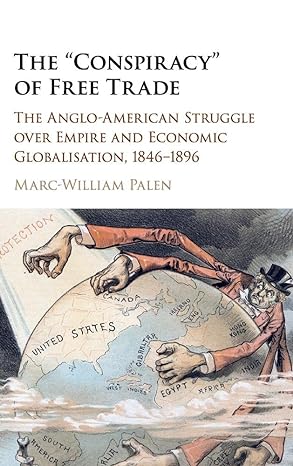
Free trade is a generalization that is often confounded by its own reality. Governments, formed from different regime types, and ideological fervor, can only remain in power if they respond to the interest of the masses. No one government can afford to ignore the interest of the people completely; and that includes a dictatorship. At some point, they are obliged to respond to the aspirations, and the frustrations of the masses. This implies an attitude that both rejects and accepts free trade at the same time, but in a myriad of forms. Free trade, in this sense, is akin to flea trade. Governments will pick and choose the industries that it can liberalize, or can’t, due to their vested interest, or face back-lash from voters.
The “Conspiracy of Free Trade” is an excellent work in the sense that it actually delves into the twists and turns of the concept across the US and UK, with the over-arching concern on how each tried to protect their industries, while concurrently, gaining from being the first to benefit from a bigger share of global markets. No one, for example, has paid much attention to Friedrich List. Many have attributed free trade to the ideas of David Ricardo and Adam Smith. But it was List who argued that certain infant industries have to be protected first before the gates of free trade are swung wide open.
Dr. Marc-William Palen is a historian at the University of Exeter. He specializes in the intersection of British and American imperialism within the broader history of globalization since the 1800s. His commentary on historical and contemporary global affairs has appeared in the New York Times, The Australian, History Today, Time Magazine, Newsweek, the Globalist Magazine, the History News Network, History & Policy, Foreign Policy in Focus, and Common Dreams, among others.
He is co-founder of History & Policy’s Global Economics and History Forum. He is also the founding editor of the Imperial & Global Forum, the blog of the Centre for Imperial & Global History at the University of Exeter.
Following the Second World War, the United States would go on to become the leading ‘neoliberal’ proponent of international trade liberalization. Yet for nearly a century before, American foreign trade policy was dominated by extreme economic nationalism. What brought about this pronounced ideological, political, and economic about-face? How did it affect Anglo-American imperialism? What were the repercussions for the global capitalist order? In answering these questions, “The Conspiracy of Free Trade” offers the first detailed account of the controversial Anglo-American struggle over empire and economic globalization in the mid-to-late nineteenth century.
The book reinterprets Anglo-American imperialism through the global interplay between Victorian free trade cosmopolitanism and economic nationalism, uncovering how imperial expansion and economic integration were mired in political and ideological conflict. Beginning in the 1840s, this conspiratorial struggle over political economy would rip apart the Republican Party, reshape the Democratic Party, and redirect Anglo-American imperial expansion for decades to come.
This book is remarkable in the sense that it was able to go to the roots of both the Democratic and Republican Party. It also explored the ideological views of Franklin Deleanor Roosevelt, who starting from the 1930s, began urging the United States to go ‘global’. The results are clear to see, an America astride the world; but also an America that is often sucked into numerous conflicts when its imperial imprints become too big and large. But the beauty of this book also lies in its excellent bibliography. There is actually a bevy of scholars who have warned about the dangers of globalization.
The question now confronting many is no longer globalization, however, but automation that is concurrent to globalization. Jobs are lost permanently, and frustrations are projected on the back of misogynistic and xenophobic sentiments. Donald Trump won the recent presidential election on the basis of these grievances, which Hilary Clinton called the “basket of deplorables.”
